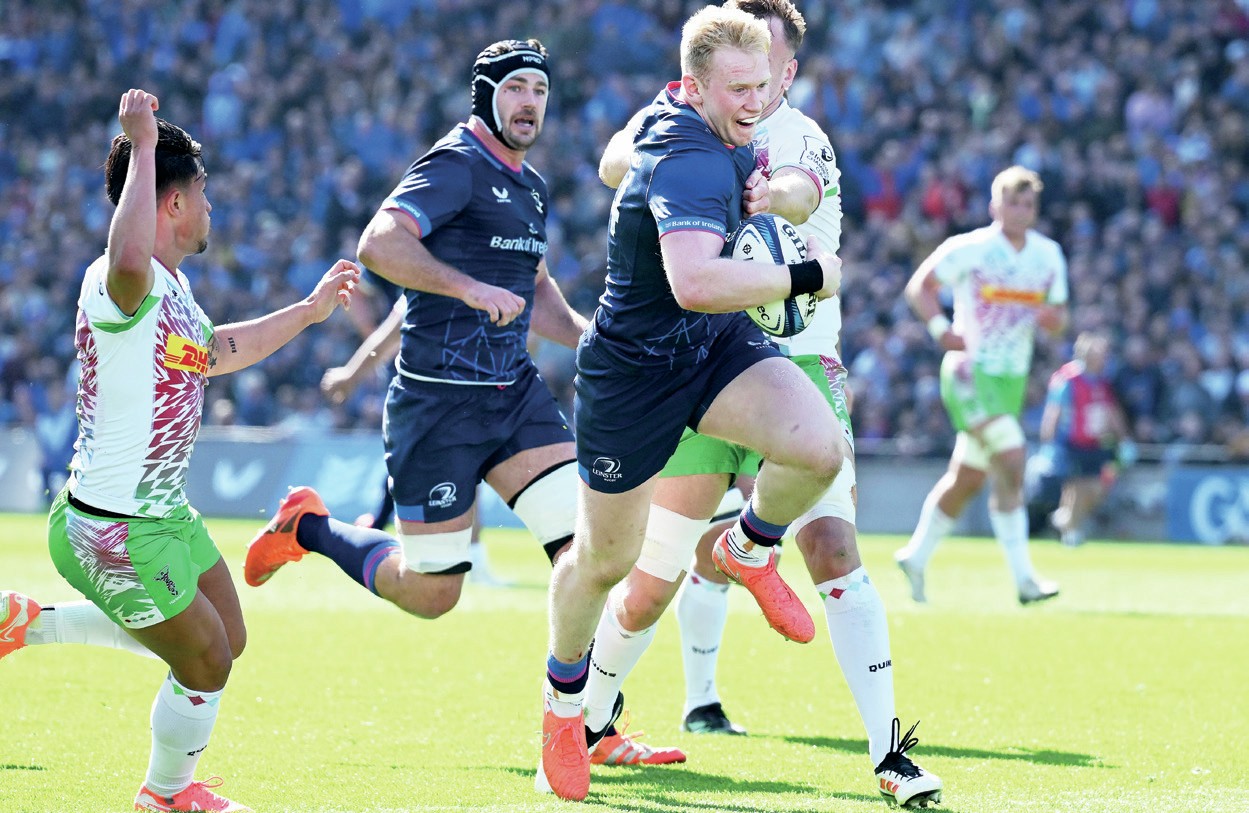
 Chris Pennell’s superb two-try contribution to the thrilling 30-30 draw in the second-leg of the Championship final at Sixways on the last Wednesday in May, which saw Worcester win promotion to the Premiership at Bristol’s expense (59-58 on aggregate), was richly deserved.
Chris Pennell’s superb two-try contribution to the thrilling 30-30 draw in the second-leg of the Championship final at Sixways on the last Wednesday in May, which saw Worcester win promotion to the Premiership at Bristol’s expense (59-58 on aggregate), was richly deserved.
Pennell is a true one-club man, spurning lucrative moves to Premiership clubs when the Warriors were relegated last season, to help lead them back to the Promised Land. We have learned with hindsight that Pennell damaged his England prospects in the process, so the exceptional full-back incontrovertibly put the club before himself.
Now that they are safely back in the bosom of the Premiership cartel, it remains to be seen whether Worcester’s figureheads, including former chairman Cecil Duckworth, act as honourably as Pennell. Their other course is to be willing participants in the murky business of the cartel currently leaning heavily on the RFU to pull up the drawbridge on promotion and relegation – by way of a five year ‘moratorium’ from 2016 – as one of their conditions for the new club-country agreement being drawn up this summer.
It appeared that they had opted for the latter when, a few days after the promotion-clincher, Warriors chief executive, Jim O’Toole, was urging his Premiership counterpart Mark McCafferty to fast-track plans to expand the top tier by promoting Bristol as well this season. “Why don’t we just bite the bullet now, bring Bristol up and make it a 13-team league next season,” O’Toole told TRP last week.
So, abandon the Championship play-off rules, and promote the losing side? After being carried away by the tide of emotion, and relief at Sixways, O’Toole must have lost his bearings. Sorry as anyone with a sporting heart was for Bristol, everyone knew the rules, and with defeat – however narrow – went their chance of going up this season.
What O’Toole should have been asking instead was how Bristol, who have now been absent from the Premiership for six years, are still not just on its payroll, but were also receiving considerably more than last season’s promoted side, London Welsh?
The answer is that their cash is guaranteed by the protectionist P share formula devised by Tom Walkinshaw, with the late Premiership chairman and Gloucester owner introducing it as an unwanted import from Formula 1. Whether you’re in the top tier or not, as long as you’ve got your P shares you’re in the money, and with a stacked-deck in your favour the chances of going back up are odds-on – although it hasn’t happened yet for Bristol.
It is a formula that lacks basic fairness and transparency, and is anti-competitive. It is also an aberration among leading leagues in most team sports – and its supporters have been forced to perform gut-wrenching contortions in their attempts to defend it.
 Duckworth, right, who remains as a director on the Worcester board, used to be a staunch supporter of promotion-relegation, and with good reason. Without it Worcester would be nowhere, a club whose ambitions would have been stillborn. Instead, they enjoyed a surge up the leagues from 1989, winning six promotions before eventually achieving their dream of elevation to the Premiership in 2004-05.
Duckworth, right, who remains as a director on the Worcester board, used to be a staunch supporter of promotion-relegation, and with good reason. Without it Worcester would be nowhere, a club whose ambitions would have been stillborn. Instead, they enjoyed a surge up the leagues from 1989, winning six promotions before eventually achieving their dream of elevation to the Premiership in 2004-05.
They have also made good use of the promotion system since. Having flirted with relegation for four seasons they fell through the trap-door back down into the Championship in 2010. Although Worcester bounced back in 2011, they took the drop again in 2014 in Dean Ryan’s first season as rugby director before rising once more thanks to their one-point play-off victory 11 days ago.
However, Duckworth, having benefitted massively from the promotion system, has a track-record of doing an about-face every time Worcester get into the top echelon and demanding that the Premiership be ring-fenced. He is not alone, with the Exeter chairman, Tony Rowe, following the same course this season despite having been a champion of a promotion-relegation meritocracy until the temptation to join the ring-fencers, thereby protecting the Chiefs new status as one of the elite, became too great.
It’s worth reflecting on just how long Worcester and Exeter have been among the top tier clubs who are so desperate to stop anyone else joining their exclusive enclave. In Worcester’s case it is eight years (deduct their two relegation years from ten), and in Exeter’s a mere five.
Yet, now, along with the Premiership cartel founders who were lucky enough to be in the right place at the right time – i.e. the top league in 1995 when the sport was declared professional – they are presuming to deny other clubs the rights that they have benefitted from.
What mandate do Worcester and Exeter – or Gloucester, Bath, Saracens (who won promotion in 1995), or re-located Wasps – have to tell clubs like Moseley or Nottingham, whose names when the leagues first started in 1989 were as illustrious as theirs, that they are stuck for good in a locked-down league structure? What right also do Worcester have to say to Jersey, who beat them in the Championship in March, or to Doncaster who are in the process of developing their ground in the same way Duckworth did with Sixways, or Rowe with Sandy Park, that they must stay put?
None. Little wonder the 2016-2021 ring-fence moratorium, which was revealed in a strategic leak in April by Gloucester chief executive, Stephen Vaughan, has been savaged since then by a number of Championship coaches.
Cornish Pirates rugby director Ian Davies said in these pages that it was a career sentence for many players and coaches in the Premiership, and that it would lead clubs and players downgrading their commitment and playing part-time rugby. Davies added, “In that case nobody’s going to be ready for promotion to the Premiership.”
That may be exactly what the cartel is planning on. If so it, and the so-far silent RFU, should be careful what they wish for.
Moseley head coach Kevin Maggs said ring-fencing would harm English club rugby, and be detrimental to the national side. He warned that talented young English players needed to be playing rugby rather than holding tackle bags at Premiership clubs, adding: “It’s a tough competition, and if England want to be the best team they need a strong Championship to enhance the talent coming through.”
Maggs also slammed the 14-team Premiership plan hatched by PRL to include hand-picked clubs Bristol and Yorkshire Carnegie in the top tier by 2016 irrespective of who wins next season’s Championship.
He argued that instead of ring-fencing, the Premiership and the RFU should fund the Championship properly, and look at the benefits to the French club game of the ProD2 model, including its two up and two down arrangement with the Top 14.
 Former Worcester head coach Richard Hill, above, who has just secured promotion for Rouen to Federale 1, the league below ProD2, also argued passionately in The Rugby Paper last week that ring-fencing and moratoriums on promotion-relegation will seriously damage the health of the club game in England.
Former Worcester head coach Richard Hill, above, who has just secured promotion for Rouen to Federale 1, the league below ProD2, also argued passionately in The Rugby Paper last week that ring-fencing and moratoriums on promotion-relegation will seriously damage the health of the club game in England.
Hill said, “France has produced huge strength-in-depth by having a free flow of teams between the divisions, and you can’t cut that off.” He pointed to the success of former ProD2 teams like Oyonnax, Bordeaux and La Rochelle in the Top 14 as proof. He also pointed to resurgent clubs like Agen and Pau securing promotion this season above last season’s relegated Top 14 sides, Biarritz and Perpignan.
That is how a merit based league works. It is also based on the LNR, the equivalent of Premiership Rugby, taking responsibility for running both leagues and ensuring a balanced distribution of central funding between the Top 14 and ProD2.
Last season the average funding for the 16 clubs in ProD2 was £4.35m each. This makes the Championship clubs, who this season were given £385,000 each by the RFU, look like paupers. It also says little for the RFU’s commitment to two professional leagues in England.
However, while coaches who know the importance of the Championship have been on the attack against ring-fencing, the Championship Clubs Committee, the body representing the 12 clubs in the league, has been surprisingly muted.
Its chairman, the Bedford Blues chairman, Geoff Irvine, recently announced a new five-year funding deal with the RFU after agreeing to a desultory annual increase to £530,000 per club from 2016.
As for the Premiership threat to cut-off promotion-relegation, it drew the weary response from Irvine that he hoped, at some point to be consulted about the game changing club-country negotiations underway between the RFU and the Premiership.
This reflects a deeply disappointing failure of the second tier clubs to draw together as a cohesive, determined group prepared to fight tooth-and-nail for their cause.
Instead of rallying around London Welsh in their battle with the Premiership for fair funding at the start of the season, recognising that it was in the interests of the greater good, they left them to it.
By opting for the parish pump, and their own little patches, rather than becoming a strong, united voice against the machinations of the Premiership clubs, they have done themselves no favours.
The Championship deserves so much more, but its committee is clearly expecting others, notably the RFU, to represent them.
We will eventually find out whether they were right to trust the RFU to fight the promotion-relegation corner implacably, or whether they have fudged the issue to keep a few Premiership owners sweet, turning the free-flowing waters of the Championship, and the leagues below, into a stagnant pool.

1 Comment
You must be logged in to post a comment Login
Leave a Reply
Cancel reply
Leave a Reply
You must be logged in to post a comment.

Latest News
Charlie Elliott: Ben Youngs’ Best Career Moments























Pingback: สมัคร LSM99 ระบบออโต้